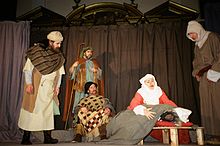Second Shepherds' Play
| The Second Shepherds' Play | |
|---|---|

The shepherds realise that the babe in the cradle is actually a sheep. Players of St Peter, London (2005).
|
|
| Written by | The Wakefield Master |
| Characters |
|
| Date premiered | Unknown (possibly c. 1500) |
| Original language | Middle English |
| Series | Wakefield Cycle |
| Genre | Mystery Play |
| Setting | Medieval England and Bethlehem 1st Century AD |
The Second Shepherds' Play (also known as The Second Shepherds' Pageant) is a famous medieval mystery play which is contained in the manuscript HM1, the unique manuscript of the Wakefield Cycle. These plays are also referred to as the Towneley Plays, on account of the manuscript residing at Towneley Hall. The plays within the manuscript roughly follow the chronology of the Bible and so were believed to be a cycle, which is now considered not to be the case. This play gained its name because in the manuscript it immediately follows another nativity play involving the shepherds. In fact, it has been hypothesized that the second play is a revision of the first. It appears that the two shepherd plays were not intended to be performed together since many of the themes and ideas of the first play carry over to the second one. In both plays it becomes clear that Christ is coming to Earth to redeem the world from its sins. Although the underlying tone of The Second Shepherd's Play is serious, many of the antics that occur among the shepherds are extremely farcical in nature.
The biblical portion of the play, a retelling of the Visitation of the Shepherds, comes only after a longer, invented story that mirrors it, in which the shepherds, before visiting the holy baby outside in a manger, must first rescue one of their sheep that has been hidden in a cradle indoors by a comically evil sheep-stealing couple. Once they have discovered and punished the thieves, the storyline switches to the familiar one of the three shepherds being told of the birth of Christ by an angel, and going to Bethlehem to offer the true Child gifts.
At the start of the play, Coll, the first shepherd ("primus pastor") arrives in a field, invoking God in anachronistic terms (referring, as the shepherds will do throughout the play, to the life and death of Christ even though at this point of the play Christ has not yet been born) complaining about the (typically English) cold weather and about his poverty and the arrogance of local gentry. He begins by saying, "Lord, what these weders are cold! And I am ill happyed" which translates as "God, the weather is cold and I am ill prepared/clothed." Gib, the second shepherd, arrives without seeing Coll and complains first about the weather and then about the plight of married men, himself included, with bawdy speculation about the lives of men with more than one wife and advice to "young men of wooing" to "Be well war of weding" (wary of marriage). He paints a portrait of his wife as a loud, heavy-drinking, alternately abusive and sentimentally pious, whale-sized woman. "By him that died for us all, I would I had run til I had lost her!" at which point he is startled by Coll. They confer about where Daw, a third, young, lazy and mischievous, shepherd, has gotten to, at which point Daw arrives complaining about employers, hunger, and about recent floods which he compares to Noah's flood.
...
Wikipedia
